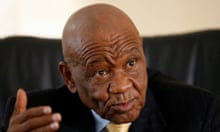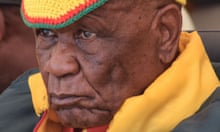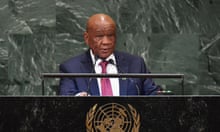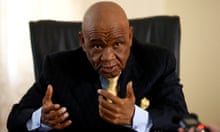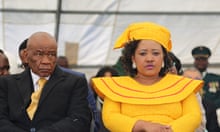Tšepo Molapo gazes into space, worrying about where the next meal will come from. Next to him, his two-year-old granddaughter plays, oblivious of their desperate situation.
Molapo’s children all died at illegal mines in neighbouring South Africa, where they had trekked in search of work.
Molapo, 80, relies on a monthly government pension payout of about $48 (£37) but the paltry amount cannot feed him and the eight grandchildren he cares for on his own following the death of his wife.
“I do not know how I am going to survive with my grandchildren,” Molapo says.
According to the UN, more than 500,000 people – a quarter of Lesotho’s population – face severe hunger due to droughts that caused a 60% fall in cereal production last year, compared with 2018.
At least 71,000 people in rural areas are “one step away from famine”, says Jens Laerke, spokesperson from the UN Office for the Coordination of Humanitarian Affairs, which in December launched a $34m flash appeal for more funding.
“We can’t plant any crops in this drought situation. The rains only came last December and everything we had planted had wilted. We have no livestock left to sell or exchange for grain. So, unless we get help, we are just going to starve,” says Molapo.
Last October, the government declared a national disaster over the food crisis, appealing to its development partners for help.
But the attention of minister appears to have been diverted by internal conflict and unrest in the country.
The prime minister, Thomas Thabane, has been at the centre of of a power struggle with his party deputy, Nqosa Mahao. Thabane, who leads the All Basotho Convention, the major player in a four-party governing coalition, has been called for police questioning over alleged links to the murder of his estranged wife, and has said he will step down.
The government has also faced strikes and threats of strikes by teachers, nurses and factory workers, who are demanding wage increases and improved working conditions.
Unprecedented strike action by magistrates, doctors and police officers has also taken place in recent months. The magistrates and doctors have sued the government for pay rises and better conditions.
The government’s efforts to secure budget support from the International Monetary Fund have so far hit a brick wall, with the organisation imposing conditions that include reducing the high public wage bill, public financial management reforms and the implementation of the much-delayed multi-sector reforms, aimed at bringing greater stability to Lesotho, that were recommended by the Southern African Development Community.
The EU ambassador to Lesotho, Christian Manahl, told the Guardian that February’s budget speech will indicate what the government intends to do to address the food crisis.
“We are waiting for the new budget to be presented, this will give us an idea about the government’s own efforts to address the challenges created by the drought of last year,” Manahl said.
The European commission is mobilising a €1.5m (£1.2m) humanitarian aid package to support people in the four districts – Mohale’s Hoek, Mafeteng, Quthing and Qacha’s Nek – that have been worst hit by drought.
The World Food Programme (WFP) is expecting to reach 174,000 people with monthly mobile cash payments to eligible families over the next six months. Those unable to access mobile money will receive food parcels.
Napo Ntlou, the WFP’s emergency coordinator for Lesotho, said that even when there is no drought, the agency provides assistance to at least 200,000 people annually in the country.
“We have engaged the government to have some projects related to building the resilience of people in the southern districts. In our five-year country strategic plan, we have a resilience component which is going to be undertaken in the southern parts of the country to ensure that at least when there are shocks, the people can recover very quickly,” Ntlou said.
For Mathabo Tlalajoe, from Mohale’s Hoek, it will take more than $52 a month to feed her family of seven.
“The intervention is welcome but it’s still not enough. We hope that the next vulnerability assessment will give us more,” Tlalajoe said.


